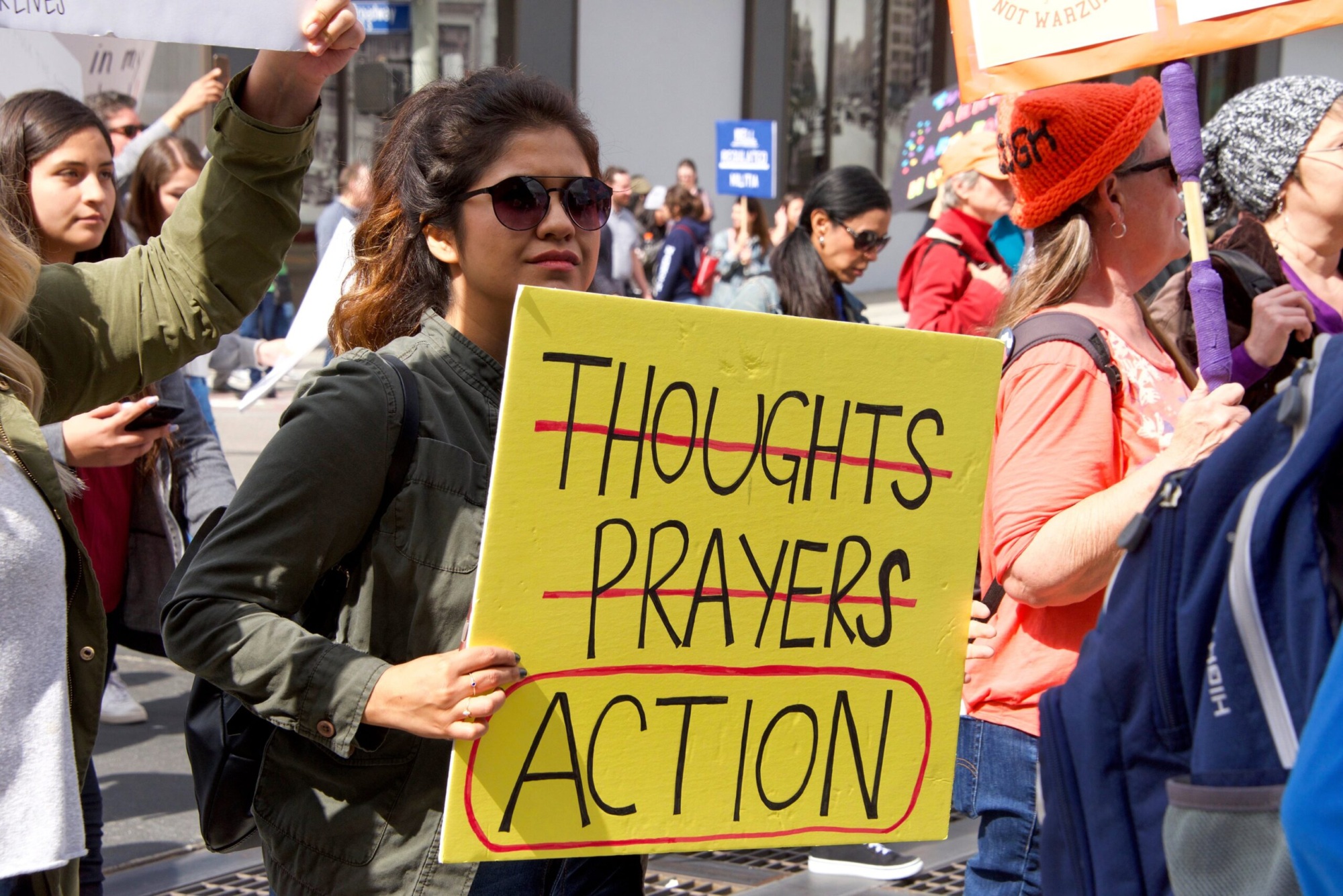The Supreme Court Expands Gun Rights Amid Rise in Mass Shootings: What Your Nonprofit Can Do to Fight Back
Issues

Los Angeles, CA – March 24, 2018: With calls to End gun violence, no more silence! thousands of students and adults march to protest gun violence. March for our lives.
On June 23rd, the Supreme Court struck down a New York law requiring individuals to demonstrate proper cause in order to obtain a license to carry a concealed handgun outside one’s home. In a 6-3 ruling, the Supreme Court held “that the Second and Fourteenth Amendments protect an individual’s right to carry a handgun for self-defense outside the home.” The opinion in New York State Rifle & Pistol Association v. Bruen, written by Justice Clarence Thomas, represents the biggest expansion to gun rights since the Supreme Court ruled in District of Columbia v. Heller that an individual has a right to keep a gun at home for the purposes of self-defense. The six conservative justices favored this decision, with Justices Samuel Alito, Neil Gorsuch, and Amy Coney Barrett writing concurring opinions. On the other hand, Justice Stephen Breyer wrote the dissenting opinion for the court’s three liberal justices.
Before this decision, New York was one of seven states and the District of Columbia that required individuals to demonstrate a strong reason in order to obtain a license to carry a weapon in public. According to the Giffords Law Center to Prevent Gun Violence, these “may issue” state laws provided significant discretion to the issuing official to grant or deny a concealed carry permit. However, as a result of the Supreme Court decision, these state laws are now in jeopardy.
What can nonprofits do in response to this Supreme Court decision?
The decision to expand Second Amendment rights comes at a time when the nation is reeling from mass shootings in Texas, California, New York, and Illinois. In the wake of increasingly troubling instances of gun violence, President Biden signed a bipartisan bill into law that includes, among other things, an expansion to background checks and more incentives for states to pass red flag laws. While this new law represents a positive step forward, lawmakers can still do much more at the federal, state, and local levels to address unnecessary gun violence. It is time to use your organization’s resources to prevent more tragedies.
It is important to remember that public charities can lobby in support of gun control legislation at the federal and state levels. They can also use this time to engage in nonpartisan candidate and public education around gun control issues. Here are five ways your nonprofit can actively take a stand against gun violence and fight for critical reforms:
- Take a stance on future federal gun safety legislation. In late June, President Biden signed the first major gun safety bill passed by Congress in nearly 30 years. However, there is more work to be done at the federal level. For example, nonprofit advocates could urge Congress to consider legislation that restricts the sale or possession of large-capacity magazines or legislation that regulates and closes the bump-stock loophole, which allows for semi-automatic weapons to function as machine guns. The Internal Revenue Code permits 501(c)(3) public charities to lobby for legislative change in limited amounts. Click here for more on how to calculate your lobbying limits.
- Engage in candidate education ahead of the upcoming midterm elections. Gun control advocacy organizations can reach out to federal and state candidates to provide nonpartisan education about gun violence and potential policy solutions. For more information, read our factsheet on how 501(c)(3) organizations can engage in nonpartisan candidate education.
- Engage in corporate advocacy by urging businesses to stand for gun control and promote the passage of sensible gun legislation. Social media is a powerful tool for nonprofit organizations looking to apply pressure. Check out our recently updated social media guide called Influencing Public Policy in the Digital Age to learn how you can use social media to amplify your organization’s message.
- Research the impact of red flag laws and engage in public education in states that have not enacted these types of laws. The bipartisan gun bill signed by President Biden in June includes state grants meant to incentivize states to enact red flag laws. These laws allow courts to order the temporary removal of guns from individuals who pose a serious risk to themselves or others.
- For 501(c)(4) organizations: Remember, you can lobby alongside your 501(c)(3) public charity colleagues and engage in some activities that support or oppose candidates for public office. 501(c)(4)s can engage in unlimited amounts of lobbying and may also engage in partisan political activities, such as endorsing or opposing candidates, so long as it remains a secondary activity for the organization.
For more information, check out a recent Rules of the Game podcast episode, which highlights the need for gun control reform in the wake of recent mass shootings.
For more ways to help and get organized, please visit our website, bolderadvocacy.org. Alliance for Justice provides a free technical assistance hotline for nonprofits with questions on advocacy. Call or email us at 866-NP-LOBBY or advocacy@afj.org.